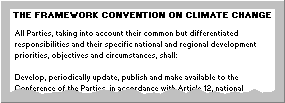 Introduction
Introduction Introduction
IntroductionDuring the 1980s, a series of scientific reviews examined the evidence for concern about global warming and concluded that the threat of climate change should be taken seriously.
In response to international concern, the World Meteorological Organization and the United Nations Environment Programme, at the request of the United Nations, created the Intergovernmental Panel on Climate Change (IPCC) in 1988. Composed of three working groups on science, impacts and policy options, the IPCC issued its first reports in August 1990. Its findings were based on a state-of-the-art review of current understanding of the greenhouse problem.
The IPCC concluded that the scientific evidence was sufficient to warrant precautionary action to curb greenhouse gas emissions and to anticipate potential impacts.
Recognizing that a global problem such as climate change required a truly international response, the Intergovernmental Negotiating Committee was then established to draft a climate convention which was eventually agreed at the United Nations Conference on Environment and Development in Rio de Janeiro in June 1992.
The Framework Convention on Climate Change has been signed by more than 150 nations. These nations commit themselves to the overall aim of "...stabilization of greenhouse gas concentrations in the atmosphere at a level that would prevent dangerous anthropogenic interference with the climate system... [to be achieved]... within a time frame sufficient to allow ecosystems to adapt naturally to climate change, to ensure food production is not threatened, and to enable economic development to proceed in a sustainable manner."

Full text of the Framework Convention
The commitments that all Parties to the Convention are expected to act upon are listed in the accompanying box. The Convention is vague concerning targets for emission control, but it places the burden of responsibility for reducing greenhouse gas emissions on the industrialized nations in view of their historical responsibility for atmospheric pollution.
The Convention recognizes the particular circumstances of developing nations and that these circumstances will affect the extent to which they can carry out their commitments, stating that "economic and social development and poverty eradication are the first and overriding priorities of the developing country Parties."
Any additional financial costs incurred by developing nations in meeting their commitments under the Framework Convention are to be covered by a special fund, managed, at present, by the Global Environment Facility.
The Global Environment Facility was established in 1990 by the World Bank, United Nations Development Programme and the United Nations Environment Programme, in consultation with representatives of both industrialized and developing nations.
The aim of the Facility is to provide a channel through which the international community can provide assistance to developing nations in their response to global environmental problems such as climate change, biodiversity, marine pollution and ozone depletion.
 "Introduction: The Causes of Global Warming"
"Introduction: The Causes of Global Warming" Index
Index